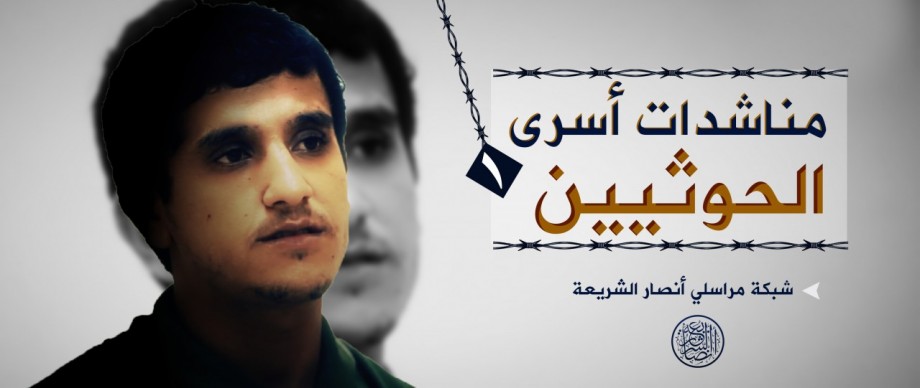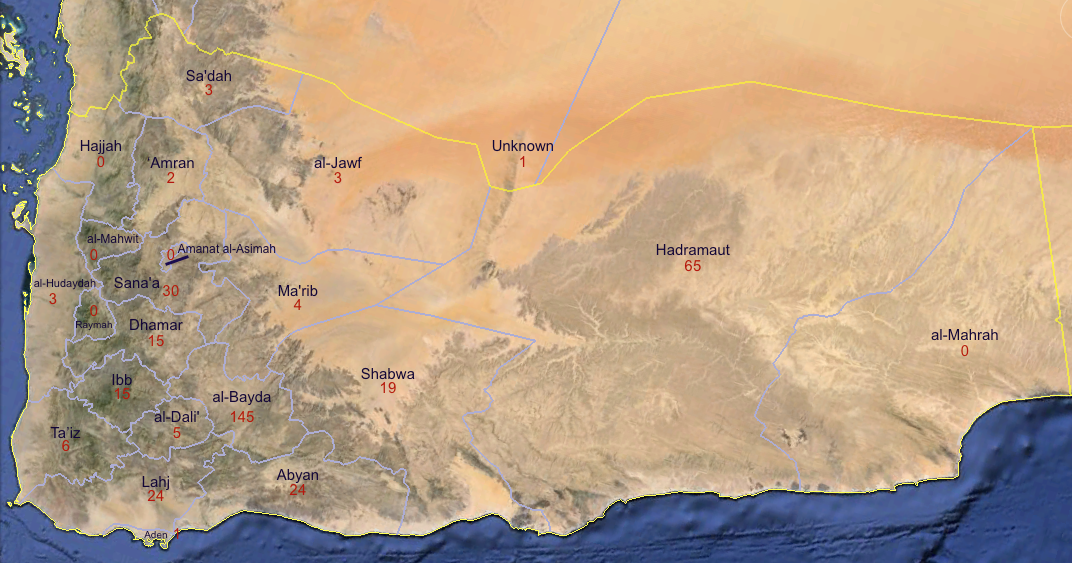
_____________________
To inquire about a translation for this video message for a fee email: [email protected]
Category: The Ḥūthīs
New video message from Anṣār al-Sharī’ah in the Arabian Peninsula: “Appeals of the Ḥūthī Prisoners #2"
Click here for the first part in this video series.
—

__________________
To inquire about a translation for this video message for a fee email: [email protected]
New video message from Anṣār al-Sharī’ah in the Arabian Peninsula: "Appeals of the Ḥūthī Prisoners #1"

___________________
To inquire about a translation for this video message for a fee email: [email protected]
Jihadology Podcast: Don't Call It a Comeback, AQAP's Been Here for Years
Katherine Zimmerman comes on the show to talk AQAP. Some of the topics covered include:
- AQAP since the death of Awlaqi and their withdrawal from territory in southern Yemen in 2012
- The effect of the rise of the Huthis and how the Saudi/Emirati war in Yemen has affected AQAP
- AQAP’s local outreach and how it compares to what it tried from 2011-2012
- How drone attacks on AQAP leadership have affected the group
- The Islamic State’s activities in Yemen and what they mean for AQAP
Links:
- Katherine Zimmerman » AEI Scholar
- Critical Threats | Katherine Zimmerman
- A New Model for Defeating al Qaeda in Yemen – Katherine Zimmerman | AEI
- AQAP: A Resurgent Threat – Katherine Zimmerman | CTC Sentinel
- Katherine Zimmerman (@KatieZimmerman) | Twitter
The podcast is produced by Karl Morand. If you have feedback you can email [email protected], or find us on Twitter: @JihadPod.
You can subscribe to the show in iTunes, Stitcher, or with our RSS feed.
Download this ep (30MB mp3)
New video message from Anṣār al-Sharī’ah in the Arabian Peninsula: "Martyrdom Operation Upon the Military Barracks of the Ḥūthī Army"

_________________
To inquire about a translation for this video message for a fee email: [email protected]
New video message from Anṣār al-Sharī’ah in the Arabian Peninsula: "Martyrdom Operation Upon a Group of Ḥūthīs in al-Ḥudaydah City – Wilāyat al-Ḥudaydah"

_______________
To inquire about a translation for this video message for a fee email: [email protected]
Check out my new article for War on the Rocks co-authored with Patrick Hoover: "What AQAP’s Operations Reveal about Its Strategy in Yemen"

The recent takeover of Yemen’s fifth largest city of al-Mukalla by al-Qaeda in the Arabian Peninsula (AQAP) highlights the growing strength of the organization. While AQAP has certainly taken advantage of the more chaotic environment as a consequence of the Houthi’s war in the south and the Saudi air campaign, the group has in fact been gearing up its own overt military campaign since last summer. Therefore, even if there is an eventual ceasefire between the Houthis and the Saudis, AQAP will continue fighting and operating on its own terms.
Background
Starting in late July 2014, AQAP made a concerted media effort for the first time to actively report and take credit for its military operations on an almost daily basis. This differed from its past pattern of only commenting on large-scale operations. In part, AQAP did this to bring attention to its new military campaign, two years after it had been kicked out of southern cities by the Yemeni military and local popular committees after governing from the spring of 2011 to the summer of 2012.
As part of this new media effort, AQAP created different Twitter accounts online to push its content, one of them being a news feed called Akhbar Ansar al-Sharia fi Jazira al-‘Arab (Ansar al-Sharia in the Arabian Peninsula News; the name of the feed is derived from a period in 2011 and 2012, when AQAP controlled tracts of territory and adopted the name Ansar al-Sharia in Yemen to circumvent perceptions of toxicity with the AQ brand). This feed has been AQAP’s key mouthpiece for releasing information on its military activities since early August 2014. Through April 21, AQAP has claimed responsibility for 374 attacks, with the vast majority against Houthi (224) and government forces (147).* Therefore, while AQAP has certainly taken advantage of the recent chaos and vacuum created by the Houthi attacks in the south and the Saudi air campaign, the organization had already been involved in a sophisticated military campaign. In many ways, the group is now just exploiting a change in conditions, which will allow them to thrive even more in the same way The Islamic State was able to in Iraq in the lead up to its takeover of Mosul almost a year ago.
AQAP’s Operations
AQAP’s modus operandi is remarkably dynamic. But while the group’s target selection, tactics, and geographic concentration appear fluid, by analyzing its attacks since August particular patterns can be discerned, which themselves offer an opportunity to assess not only the magnitude but also the nature of the threat AQAP poses to security and stability in Yemen.

Click here to read more.
New statement from The Islamic State: "Adopting the Martyrdom Operations Against the Dens of the Ḥūthīs – Wilāyat Ṣana'ā'"

Click the following link for a safe PDF copy: The Islamic State — “Adopting the Martyrdom Operations Against the Dens of the Ḥūthīs – Wilāyat Ṣana’ā'”
_______________
To inquire about a translation for this statement for a fee email: [email protected]
al-Malāḥim Media presents a new video message from al-Qā’idah in the Arabian Peninsula: "From the Field: Different Operations Against the Ḥūthī-ized Military – Ḥaḍramawt Governorate"

____________
To inquire about a translation for this video message for a fee email: [email protected]
Check out my new 'Policy Alert' for The Washington Institute: "The Islamic State's Archipelago of Provinces"
![]()
This week, Abu Bakr al-Baghdadi, the leader of the Islamic State of Iraq and al-Sham, released a rare public message in which he declared the creation of several new “provinces” in various Arab countries. It was the first time that he and his organization have acknowledged groups that have pledged baya (religiously binding oath of allegiance) to the so-called “Islamic State” since the announcement of its “Caliphate” six months ago. The audio message offers insight into the group’s expansion model and its plans for exacerbating religious tensions between Sunnis and Shiites beyond Iraq, Syria, and Lebanon. Whether Western governments want to admit it or not, the reality is that the Islamic State has expanded in a non-contiguous manner outside its base and now has authority over satellite groups and small amounts of territory outside Iraq and the Levant.
Click here to read the rest.
